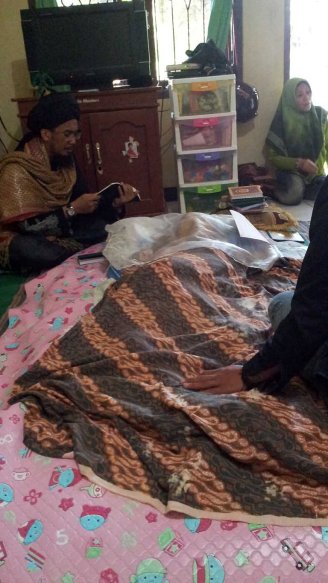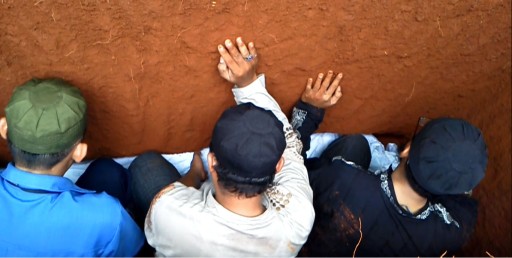The day before I wished I were on Arafah desert with the pilgrims, asking God’s forgiveness for all my past wrongdoings and praying for the best of future for my family. I didn’t know if my family and I would face a series of sacred events following this humble aspiration of mine.
I went home that day to find my husband looking confused with the fact that his mum hadn’t been swallowing her foods. She instead fell into constant deep sleep, snoring for breath in her slumber. My mother-in-law had been with us for about 40 days. I had suggested her children to move her to my house so that it would be easier for my dear hubby to take care of both my son and his mum at the same time. She’d been a lot more content since, having her beloved son always by her side — reading her Qur’an, salawat (salutations to the Prophet), and various zikr. At other times, my husband would play her old songs from the 60s and 70s to ignite nostalgic moments in her memory.
That day, out of concern, I suggested to get liquid food injected into her body. But, it wasn’t a wise advice. I simply didn’t know how to help ease my husband’s worry. He seemed to have already had a strong feeling that it was probably her time. The sound of takbir was resounding outside… Allahu Akbar Allahu Akbar Allahu Akbar, La ilaa ha illallah huwallaah hu akbar, Allahu Akbar walillaa hil ham. It was the 10th of Djulhijjah; it was Eid. A special day of festivity. And, we both sensed that something special was going to happen.

The eve of Eid — my husband constantly standby his mum’s side; my son was heedless on the occasion, immersed in his tablet games
My husband stayed up all night, next to his mother who had been opening her mouth wide trying to breathe in her sleep. Her limbs shook occasionally upon my husband’s completion of Qur’anic recitation. Both my son and I witnessed the event not knowing exactly what to feel. My son probably didn’t understand about the magnitude of the occasion going to take place at his home.
My husband and I didn’t want to alert anyone, neither our relatives nor our neighbours. His mum had had worse encounter of being in critical condition about two months ago, yet she had returned to her consciousness after one night of worrisome on-standby waiting by our relatives. Death is a secret to human beings. Only God knows exactly when each living creature is due. So, that night, it was only him and me, and my son, waiting for an outcome.
Putting my son asleep, I was awaken at 3:30 a.m. feeling intense heat in my room. I looked at my son and apparently he didn’t feel the same. He slept very quietly, like nothing happened. Then, I checked on my husband. He’s still with his mum, reciting Qur’an and salawat for her. He had finished reading the whole Dalail Khayrat that night. He hadn’t slept all night.
My entire house had fallen into quiet moments since the night before, moments of waiting uncertain, hopeful that if she was to be taken away, she would pass on in honour on that blissful day of Eid. Furthermore, it was Friday — a day most special, where all good deeds have multi-fold heavenly rewards. So to us, the Muslims, to die on Friday, especially on Eid, is everyone’s wish. Khusnul khotimah — to die and be dead in the best of physical and heavenly state, being pleased with the Lord and having the Lord’s pleasure on us. In fact, for his deep love to his mother, my husband had been praying that God would give her honour by choosing that blessed day to take her life.
I performed ablution and did two raka’ats (cycles) of prayer. In a long prostration, I prayed that if that would be the time my mum-in-law was taken, Allah would make everything easy for her. Already bathing, my husband went to the mosque for subh (dawn) prayer in congregation. I went to bathe and got myself ready for Eid.
At 4:30, my husband returned from the mosque and again sit by his mum. After a while, he called me letting me know that it’s time. Having been ready in my nicest dress, I accompanied my husband reciting Allah, Allah, Allah… to help my mum-in-law remembering only God in her last breaths. One breath, two breath, three breath… and she inhaled no longer. “It’s done,” my husband said. It was 4:50.

My husband reading Yasiin while visitors continuously flowing in
I’d never witnessed anyone’s last moments before, so I wasn’t sure. From what I heard, many people went through such a heart-wrenching ordeal in their last moments. Some excreted foams from their mouths; others vomited blood, and so on. So seeing quiet passing on didn’t feel like one for me. My husband though, cuz he had accompanied one of his aunts’ last moments before and it had similar easy lifting off of the spirit, he ascertained me by showing that his mum’s breast was no longer going up and down. Sinking in the moment, realizing how wonderful and peaceful last moments she had, my husband and I decided to slowly think through what to do next. I took some time to perform my subh before joining my husband SMS-ing close relatives about the news. We then read Yasiin, a chapter of the Qur’an that is usually read to accompany the journey of the spirit in its new realm of death.
Relatives began to show up one by one, the first one at 6:00. Neighbours dropped by before they went to the field where Eid prayer was organised. Together with a few relatives, we began coordinating on spreading the news and notifying our local funeral procession service. We moved her body to the living room so visitors could easily pay their respect and read her prayers and Yasiin.
Funeral procession
After Eid prayer was done, our neighbours started to send us foods. Our community ladies began to get organised to bathe the body. My husband, his elder sister, one of his cousins, his two aunts, and I joined the cleansing procession. It was an eye-opening encounter for me. It was the first time I participated in bathing a dead body and I was extremely humbled realizing that this was how we all would become. Our lifeless body would eventually be a mere lump of flesh carried and turned over helplessly, unable to complain to any kind of treatment whatsoever. What good do external beauty, wealth and status have then?

Bathing procession; the deceased body has to be treated gently and all her awrads (private parts) have to be safeguard from the vision of men except for her son’s of course
Being the leader of the family, my husband — in conjunction with all elderly relatives’ advices, his uncles and aunts — ordered for the salat jenazah (funeral prayer) to be done immediately after Friday prayer. It was said that if there are more than 3 rows of men participating in salat jenazah, the respective dead would be saved from the torments in the grave. Therefore, my husband hoped to achieve that.
It was said that if there are more than 3 rows of men participating in salat jenazah, the respective dead would be saved from the torments in the grave.
At 11:30, the men — my husband included — carried the casket over their shoulders and walked briskly to a nearby mosque where Friday prayer was organised. Almost a hundred men and women followed in cars, on motorcycles, or simply walking. The good thing about passing on on Friday morning is the chance of being ready at the mosque before Friday prayer so that many people in congregation would stay on for the salat jenazah. Alhamdulillah, there were more than 3 rows of people praying for my mum-in-law.
At about 1 o’clock in the afternoon, after the prayer procession had completed, the army of men carried the casket again, half-running, heading to the cemetery located about one kilometer away from the mosque. Led by my husband, who took the right front corner of the casket on his shoulder, the army proceeded in speed as if it was propelled to move faster with the wind. Repeating La ilaha illallaah (there is no god but God ) in unison, 6 or 8 men carried the casket at each corner and centre like soldiers of Allah. While all took turn carrying it over their shoulder, my husband always refused for replacement. The front right corner was all the way my husband’s. Barefooted, he walked briskly wishing to not cause any delay to the funeral. According to testimonies of a few carrier men, my husband was really determined that some of them occasionally stumbled to catch up.
It was said that the faster the body is buried, the happier the spirit is.
The first time I saw my husband carried his mum’s casket over his shoulder on his bare feet, I felt so touched that I almost cried in admiration. How strong this man is! How immense his love is to his mother! Witnessing his journey of treating his mother day in day out when she was alive in bed — cleansing her dirts, feeding her, and comforting her with recitations of beautiful verses — and seeing his dedication to give his mother the best up to her death was really commendable. Something I myself hope similarly for my own mum. Would I be like him when my time comes to tend to my mum?
Anyway, despite my determination to follow the entourage on foot, I fell out of breath that I had to hitchhike halfway. By the time I got there, the body had been lowered to the ground and three men — my husband and his two cousins — had been inside, setting the best position for his mum in her final resting place. My husband recited azan — call to prayer — out loud from the grave. Allahu Akbar Allahu Akbar… resonating against the grave walls and permeating into the air. Wooden boards were laid slanted to cover the body before the soil was returned to the hole. Gravediggers shoveled in the soil and the three men inside helped leveling the soil tidy.

My husband (on the right) reading azan in his mum’s grave
Everything was so fast. Soon enough a small, elongated mound of soil was formed, grave marker was planted and flowers were spread over the freshly dug ground. Hundreds gathered and a lovely prayer was recited by my husband’s ustadz (teacher). Many left shortly while some closest relatives stayed a while. My sister in law and one of her cousins cried profusely that they had to be pulled away from the site by several cousins.
It was said that one shouldn’t lament profusely on the dead because their spirit wouldn’t rest in peace knowing their loved ones are not in ease upon their demise.
I stayed for a while, accompanying my husband, who wished to offer his prayer a little longer. We were the last two there.

My husband’s ustadz leading the congregation reciting prayers for the dead and the living
The chaos ended after many guests offered their condolence and left. A few close relatives stayed over to lend their assistance for the upcoming prayer offering, various bill settlement, returning of our neighbours’ cutleries, carpets, and mosque’s chairs, etc. My husband suggested that we organised the tahlil — a congregational supplication session for the deceased — on the 3rd and 7th days to give a break to us, family members, so that we wouldn’t get too exhausted.
Reflection
At night, none of us could fall asleep. My husband and I were contemplating on how smooth and easy and quick everything was — from my mum-in-law’s last moments to the funeral procession. She was really honoured to have such privileged moments of dying and death. After more than a year of staying in bed, feeling excruciating pains of her broken bones and slowly losing her abilities and sights, she had finally reached contentment with life and God’s Decree at her last days of her life. No more cries, no more complains, no more slander or backbiting, nor dislikes of others. We heard no more such things during her last 40 days being at our place, under my husband’s loving care.
Her extreme pains had purified her, hence her most noble death on Eid, on Friday, with more than 3 rows of men praying on her, with army of love carrying her to the grave on their shoulder, and with grave ready to house her body.
My husband was most happy of all. He managed to stay with her, tending to her, until her last breath. Not only that, up to her grave even! He felt privileged and I was so happy for him. I loved him more than ever after witnessing his journey with his mum. In fact, no one was as privileged as my husband, and personally I myself felt so honoured to have witnessed such noble last moments.
My husband has two elder sisters, and none of them were privileged to accompany their mother up to her last breath. His second sister, Mira, despite our SMS reminders to ask her to come to spend the night, wasn’t able to be there in time before her last moments. My husband’s eldest sister, Intan, was even worse, she was just arrived in South Korea for holiday with her friends and couldn’t return immediately because the flight was so expensive. I think she was most devastated. Her holiday was completely ruined, unsure if it’s right to still enjoy it. So truly, both my husband and I were extremely privileged to have witnessed all. Alhamdulillah!
Experiencing such noble passing, I pray that I’d be among the fortunate ones who have such honourable dying and death. I hope I’d still have my loved ones (husband and children) to see through my last moments, determined to ask God to make my ending as beautiful as my mum-in-law’s or even better. Insya Allah…






